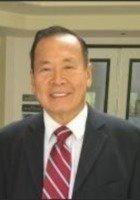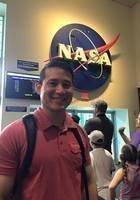Connect with hundreds of tutors like Jimmy
Who needs tutoring?
FEATURED BY
TUTORS FROM
- YaleUniversity
- PrincetonUniversity
- StanfordUniversity
- CornellUniversity

Jimmy
About Me
I am a great tutor because of my technology background. Based on my publications in solid/liquid state EPR and NMR of polymer, catalysis, liquid crystals, and inorganic complexes and glasses and magnetically oriented phospholipid/lanthanide bilayer. Spin flip and spin flop processes in magnetic multilayers, sputter deposition of magnetic multilayers in NiFe/Ru system , experience as Professor of Chemistry, Area Coordinator in Chemistry & Chair, Natural and Physical Sciences Division, a Ph.D. degree in Physical Chemistry from UCLA, and a valid California CSET Credential in Chemistry III and IV, I am confident that I would be a great addition to your team. During my 6-year tenure as Professor of Chemistry and Chemistry Area Coordinator at Lane College, I taught Undergraduate Research in Chemistry, General Chemistry, Physical Chemistry, Organic Chemistry; lecture and lab. I set up the Chemistry labs and introduced 19 new experiments for undergraduate research in chemistry. To date, chemistry students who have benefitted from undergraduate research supported by the grant include 2 students admitted to the M.S. program and 3 students admitted to the Ph.D. program. During the summers of 2012 and 2013 I worked with gifted students enrolled in Summer Science Academy from grades 8th, 9th, and 10th and in Upward Bound from grades 11th and 12th. The research work performed by two students this year and four students enrolled in Upward Bound Chemistry this summer has resulted in two abstracts accepted for presentation at the 2013 National Organization for the Professional Advancement of Black Chemists & Chemical Engineers (NOBCChE) National Meeting in Indianapolis, IN.At Alliant International University I am teaching Introduction to Chemistry and Society, lecture and lab. We use Sapling Learning and Late Nite Labs . Sapling Learning is an online homework system providing collaboration, software expertise and consulting to tailor the course to fit my instructional goals and student needs. Late Nite Labs are highly immersive digital science labs are realistic science lab simulations offering an authentic, accessible experience that moves learning beyond the classroom. The labs give students the freedom to experiment to learn from their mistakes at their own pace, at any time or place. At Mt San Jacinto College and Southwestern College, I taught Introductory Chemistry, lecture and lab, and at Texas A&M University at Qatar, I taught General Chemistry for Engineering Students, lecture and lab. I set up the weekly laboratory and direct lab technicians to prepare materials for assigned courses. In the past, I have taught Analytical Chemistry and Instrumental Chemical Analysis, undergraduate level and graduate level Physical Chemistry courses and directed research in a university with M.S. and Ph.D. programs. I have over 65 research publications and over 60 conference presentations. I'm excited about joining Varsity Tutors and the ability to help Varsity Tutors succeed. Thank you in advance for your time. Please do not hesitate to contact me if you have any questions. I would appreciate the opportunity to review my qualifications in more detail and welcome your call. I am available 10 hours per week to work as a tutor. I am available all year round to work as a tutor. The general times I can teach are Saturday, Sunday and Monday evenings.
Education & Certifications
Q&A with Jimmy
Tutoring Subjects
Connect with a tutor like Jimmy
Connect with a tutor like Jimmy
Tutors with Similar Experience

Joseph
10+ YearsMoravian College and Moravian Theological Seminary
Bachelors, Political Science/Math
View Profile
